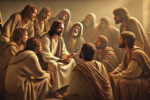The Forerunner of Jesus
The Forerunner of Jesus
Throughout history, God often prepared people for significant events or encounters by sending messengers or prophets to announce them beforehand. John the Baptist served as a forerunner, preparing the hearts and minds of the people for the arrival of Jesus, the long-awaited Messiah.
Who was John the Baptist?
John the Baptist was born to Zechariah and Elizabeth, who were godly, devout Jews from the tribe of Levi. His birth was foretold by an angel, who proclaimed that he would prepare the way for the Lord. He was the one that prophet Isaiah spoke of when he said, “The voice of one crying in the wilderness: “Prepare the way of the Lord; Make straight in the desert, a highway for our God.”” (Isaiah 40:3). He was anointed even while in his mother’s womb. John grew up in the wilderness, clad in camel’s hair and living on locusts and wild honey. To know more about John the Baptist, click here.
John’s ministry of Preparation
John’s ministry was to prepare the hearts of the people and set the stage for public ministry of Jesus Christ. He did this boldly and without compromise. He preached repentance, called out hypocrisy, and proclaimed Jesus.
a. Message of Repentance
John preached boldly in the wilderness of Judea. His message was simple and clear. “Repent of your sins and turn to God, for the kingdom of heaven is near.” (Matthew 3:2)
b. Baptism of Repentance
During those days many people responded to John’s preaching, and when they repented and confessed their sins, he baptized them in the Jordan river.
Baptism was a public proclamation of the inward change of repentance that had taken place in their heart.
c. Message to the Pharisees and Sadducees
The Pharisees and Sadducees were the religious leaders of that day. John challenged their hypocrisy, calling them a “brood of snakes”, because externally they did everything that was right (according to the law), but internally their hearts were far from God. He warned them of the danger of basing their salvation purely on their religious status or their heritage (as children of Abraham). Instead, he called them to genuine repentance and true inward transformation, which was what God was looking for.
d. John’s proclamation of Jesus
John proclaimed the identity, mission and authority of Jesus to inform the people about the one who was coming after him.
Identity
In Matthew 3:11, John the Baptist told the people, “I baptize you with water for repentance, but he who is coming after me is mightier than I, whose sandals I am not worthy to carry. He will baptize you with the Holy Spirit and fire.” By stating that the one who is coming after him (Jesus) is greater than himself, and that he is unworthy to even touch his sandals, John emphasizes the deity and the unparalleled greatness and holiness of Jesus. And in John 1:29, as Jesus walked towards him, he told the bystanders, “Look, the Lamb of God, who takes away the sin of the world!” This identifies Jesus as the sacrificial Lamb foretold in Isaiah 53, and highlights his identity as the Savior of the world who can take away our sins.
Mission
John declares that Jesus will baptize people with the Holy Spirit and fire. The baptism with the Holy Spirit signifies empowerment, spiritual renewal, and transformation for believers. It represents the indwelling presence of the Holy Spirit, who guides, empowers, and sanctifies believers in their walk with God. The baptism with fire symbolizes purification and judgement. The fire cleanses the sins of the righteous, and consumes the wicked at the time of judgment. There will be a clear separation of the godly and the ungodly at that time. But we are now in the period of grace where there is still opportunity to surrender our lives to God.
Authority
John did not sugarcoat the truth when he informed the people in Matthew 3:12 of what Jesus would do, “He is ready to separate the chaff from the wheat with his winnowing fork. Then he will clean up the threshing area, gathering the wheat into his barn but burning the chaff with never-ending fire.” John describes Jesus as the one ready to separate the chaff from the wheat with his winnowing fork. This imagery reflects Jesus’ authority and power to judge humanity. Like a farmer separating valuable wheat kernels from worthless chaff, Jesus will distinguish between genuine followers and hypocrites. He will bring accountability and justice to all, gathering the righteous into God’s kingdom while condemning the unrepentant to eternal punishment. This proclamation underscores Jesus’ authority as the ultimate judge and the seriousness of his mission to establish God’s righteous rule.
e. John baptizes Jesus
Jesus traveled from Nazareth in Galilee to the Jordan River to be baptized by John the Baptist. Initially, John hesitated, feeling unworthy to baptize Jesus and questioning why Jesus would come to him. However, Jesus insisted, explaining that it was necessary to fulfill God’s requirements. Then, John agreed and baptized Jesus in the Jordan River.
Following his baptism, a remarkable event occurred. The heavens opened, and the Spirit of God descended upon Jesus like a dove, resting upon him. Simultaneously, a voice from heaven proclaimed, “This is my beloved Son, with whom I am well pleased.” (Matthew 3:17) This divine declaration affirmed Jesus’ identity as the Son of God and marked the beginning of his public ministry.
Hope for Today
John the Baptist’s message carries a sense of urgency and severity, as he boldly proclaims the need for repentance and warns of the impending judgment. However, within this apparent severity, there is a message of profound hope.
John’s message of repentance is a call to turn away from sin and hypocrisy. While this may sound harsh to some, turning away from sin, leads to a new way of life, one of transformation and renewal. It offers hope that despite humanity’s brokenness and sinfulness, there is the possibility of change and restoration through God’s grace.
John’s uncompromising message of impending judgment can invoke fear and anxiety, but it also presents an opportunity to turn to Jesus, who has the power and authority to rescue us from that terror. Rather we can find safety in his promises, for there is much hope in the grace, mercy and redemption offered by God through Jesus Christ.












